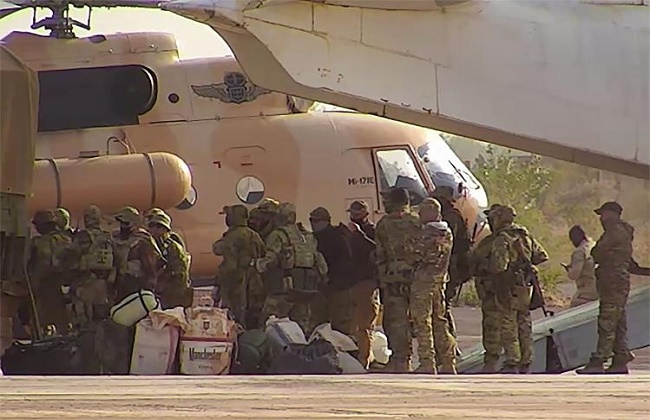
Hours after Russian mercenary leader Yevgeny Prigozhin rebelled against his country’s top military leaders, his private army’s biggest client in Africa panicked, turning for help to his foe in the West.
Officials from Central African Republic, where some 1,500 of Prigozhin’s shadowy Wagner Group mercenaries were stationed, wrote a letter that day, requesting to “rapidly” arrange a meeting with a private U.S. security firm to discuss collaboration.
Dated June 23, 2023, the day Prigozhin launched the armed rebellion, the letter sparked a series of private meetings, culminating in a deal with the central African nation and Bancroft Global Development. That sparked backlash from Russian mercenaries, according to a dozen diplomats, locals, and analysts.
The tensions in Central African Republic are a window into a larger battle playing out across the continent as Moscow and Washington vie for influence.
The Russian mercenaries — using success in staving off rebels in this impoverished nation as a model for expansion — have long been accused by locals and rights groups of stripping natural resources such as minerals and timber and are linked to the torture and death of civilians. In the wake of Prigozhin’s rebellion and suspicious death in a plane crash, the Russians are recalibrating their Africa operations. The United States, which has been largely disengaged from the region for years, is attempting to maintain a presence and stymie Russian gains as it pushes African countries to distance themselves from the mercenaries.
U.S. officials blame Russia for anti-American sentiment in the region and say they’re trying to shift the narrative.
“If the U.S. can’t regain a foothold, it could give Russia greater economic and political leverage,” said Samuel Ramani of the Royal United Services Institute, a defense and security think tank. “If Russia loses Central African Republic, its flagship model on the continent, there could be a domino effect in other countries.”
In recent years, Russia has emerged as the security partner of choice for a growing number of governments in the region, displacing traditional allies such as France and the U.S.
Moscow aggressively expanded its military cooperation by using mercenaries like Wagner, who have operated in at least half a dozen countries since around 2017. They’re tasked with protecting African leaders and in some cases helping fight rebels and extremists.
They’re also plagued by their human rights record. Two years ago in Mali, Wagner and the army were accused of executing about 300 men — some suspected of being Islamist extremists, but most civilians — in what Human Rights Watch called the worst single atrocity reported in the country’s decade-long armed conflict. And in Central African Republic, mercenaries train the army on torture tactics, includinghow to cut hands, remove nails, throw fuel and burn people alive, according to watchdog The Sentry.
A soldier who spoke on condition of anonymity for fear of reprisal confirmed torture tactics and told The Associated Press he saw mercenaries put a fellow soldier into a sweltering container as punishment. He said people could stay locked in containers for three weeks, with many dying inside.
Central African Republic was one of the first places the mercenaries entered. The country has been in conflict since 2013, when predominantly Muslim rebels seized power and forced the president from office. Six of the 14 armed groups that signed a 2019 peace deal later left the agreement. Locals and the government credited Wagner with fighting back rebels who tried to overtake Bangui, the capital, in 2021. The Russians soon expanded to Burkina Faso and Niger, and have ambitions for further growth.
Russia is refurbishing a military base some 50 miles (80 kilometers) from Bangui. Alexander Bikantov, Russia’s ambassador to Central African Republic, said the base will improve the country’s security.
Fidele Gouandjika, adviser to President Faustin-Archange Touadera, said the base aims to have 10,000 fighters by 2030 to engage with more African nations.
Some countries see Russia’s influence as a threat to their own, but conflict analysts say weakening it will be challenging if they won’t offer a similar force to pursue armed groups.
Wagner is steeped in Central African Republic’s security system, and experts say that will likely prevent Touadera from easily diversifying security partners.
Touadera’s office didn’t reply to written requests for comment for this story. His adviser to the country’s spy agency declined to be interviewed.
The U.S. had been pushing Central African Republic to find an alternative to Wagner for years. A December 2022 private meeting sought ways to improve security without the mercenaries but yielded little tangible progress, according to a U.S. official who is familiar with the talks and spoke on condition of anonymity due to the privacy of ongoing discussions.
“We never really got past the confidence-building steps,” he said. “Steps on how XYZ would replace Wagner were abstract, and the door remains open.”
The more assertive U.S. approach came as it faced new setbacks and tried to rework agreements in the region. Its troops left Chad and Niger, where they were no longer welcome.
Still, the State Department said in a statement early this year that it wasn’t involved in the decision to establish Bancroft Global Development’s presence in Central African Republic.
But Washington could deny such contracts if it wanted, said Sean McFate, a former contractor in Africa and author of “The New Rules of War.”
The U.S. has used private military companies to reduce American “boots on the ground” in Africa, McFate said, and companies like Bancroft have to play by Washington’s rules if they want future government work.
In response to AP questions, the U.S. official who spoke on condition of anonymity said it uses private contractors in Africa to help countries operate more effectively, with U.S. government oversight to ensure accountability. The official said the State Department has overseen Bancroft’s work in Somalia but not Central African Republic or elsewhere

